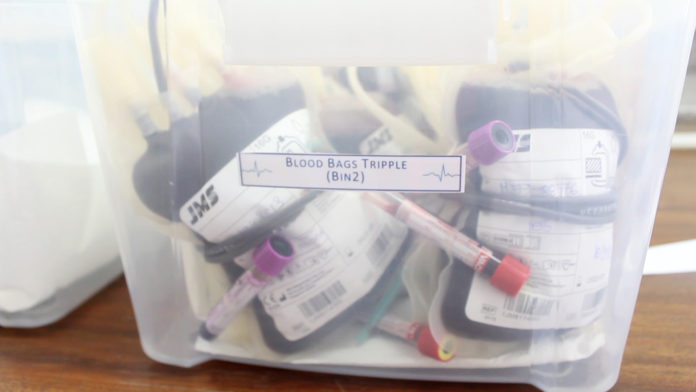Kericho, May 14 — It’s mid-morning and Mary Moraa and her sister sit at the reception to the Kericho Blood Transfusion Center at the Kericho County Referral Hospital in western Kenya, about 270km (168 miles) away from the country’s capital, Nairobi.
More and her sister have just donated blood at the county Hospital to help save their kin who had fallen ill at the same hospital a few days ago.
“When the doctor told us that our cousin was in dire need of blood to save her life and that there was no blood in the blood bank that would match hers, we had no choice but to walk to the Centre and donate some for her,” Moraa says.

She continues to explain that even though her sister’s blood did not match their cousin’s the doctors wouldn’t take chances but encourage her to also donate blood as they said there was not enough blood at the hospital and that it would help save other people’s lives.
For the past few months, Kenya has had a challenge with blood donations after the US stopped funding blood drives around the country.
Coupled with the government’s directives banning groupings and, minimizing movements and advising people to stay home in order to curb the spread of COVID-19, running blood drives is a challenge. Kenya mostly depended on schools and colleges to get blood donors. All learning institutions are closed at the moment since March 15 when President Uhuru Kenyatta directed the same after Kenya confirmed the first case of coronavirus disease on March 13.

However, the then Cabinet Secretary for Health, Sicily Kariuki had expressed optimism that blood transfusion services will continue as “normal” despite the US President’s Emergency Plan for Aids Relief (PEPFAR) announcement to stop providing the Ksh2billion ($18.7million) annual funding from September 2019.
Kariuki, who had spoken in September last year at a press briefing held at the Ministry headquarters Afya House in Nairobi, noted that the country was in need of one million units of blood every year and that if 1.5 to 2% of the population would donate, it would be enough.
“I would like to thank the US government for the support it has been extending to KNBTS over the years. However, as a responsible government, we would like to reassure all Kenyans that we shall strive to ensure the funding gap is addressed appropriately,” she said.

But her counterpart, the current Cabinet Secretary, Mutahi Kagwe expresses concern that there is an acute shortage of blood in the country. Speaking end of April during an update of the COVID-19 situation in the country, Kagwe said that the country needs to do more to collect blood.
“A critical review of blood situation in Kenya shows that there is a huge, huge, huge gap that we have and to ensure that we can respond to our patients we need to address this issue with the utmost seriousness that we can garner,” he said.
At the Kericho County Referral Hospital, patients’ relatives like Moraa continue to walk to the County Blood Transfusion Center to donate blood and save the lives of their loved ones. This has been the trend in the past months after the country confirmed its first case of COVID-19, worsening the already staggering blood situation in the country.

Dr. Josphine Korir, the person in charge of the County’s Blood Transfusion Center however claims that there is enough blood in the county hospitals, contrary to the Cabinet Secretary, Mutahi Kagwe’s concern two weeks ago.
“We have enough blood at the County. There is no shortage,” Dr. Korir said in a phone interview.
Eric Tonui, the Medical Superintendent at the Longisa County Referral Hospital in the neighboring Bomet County expresses fears that if the coronavirus situation continues to threaten hospitals and societal behavior, then many lives will be at stake.

“There is shortage, I wouldn’t lie to you. Our main donors were schools and colleges and now that they have been closed after the government directive to curb the spread of the COVID-19, there is a reason for concern about the blood situation, not only in our county but the whole country,” Tonui says.
A health worker at the Kericho County Referral Hospital who spoke to Ubuntu Times on condition of anonymity for fear of jeopardizing his job said that there is an acute blood shortage at the hospital and that the officials there need to disclose the real situation to the public.

“If you came here three or four months ago, you would find that there was a lot of blood that was poured away. There was a change in the management of blood transfusion in the country and that is what really messed things up. They will only blame the cutting of funding by the US but that is not really the case because that would only cater for buying the reagents and some staff who were laid off immediately,” he said.
“Sometimes, the county governments across the country are able to take care of the reagents and ensure that patients who need blood are well taken care of and their lives saved. The issue is in the functions of these governments where a few individuals still want to hold on to the blood transfusion function in the national government when health has already been devolved and is now controlled by county governments,” he explains, noting that the same should as well be devolved if the government really needs to save lives especially in the wake of the coronavirus pandemic.

But as for Moraa and other donors, all they hope for is that things get back to normal so that people can be saved.
“It’s not even only our relatives who would need blood, other people also need blood and their lives should be saved. Government should rethink such an important aspect,” she concludes.

